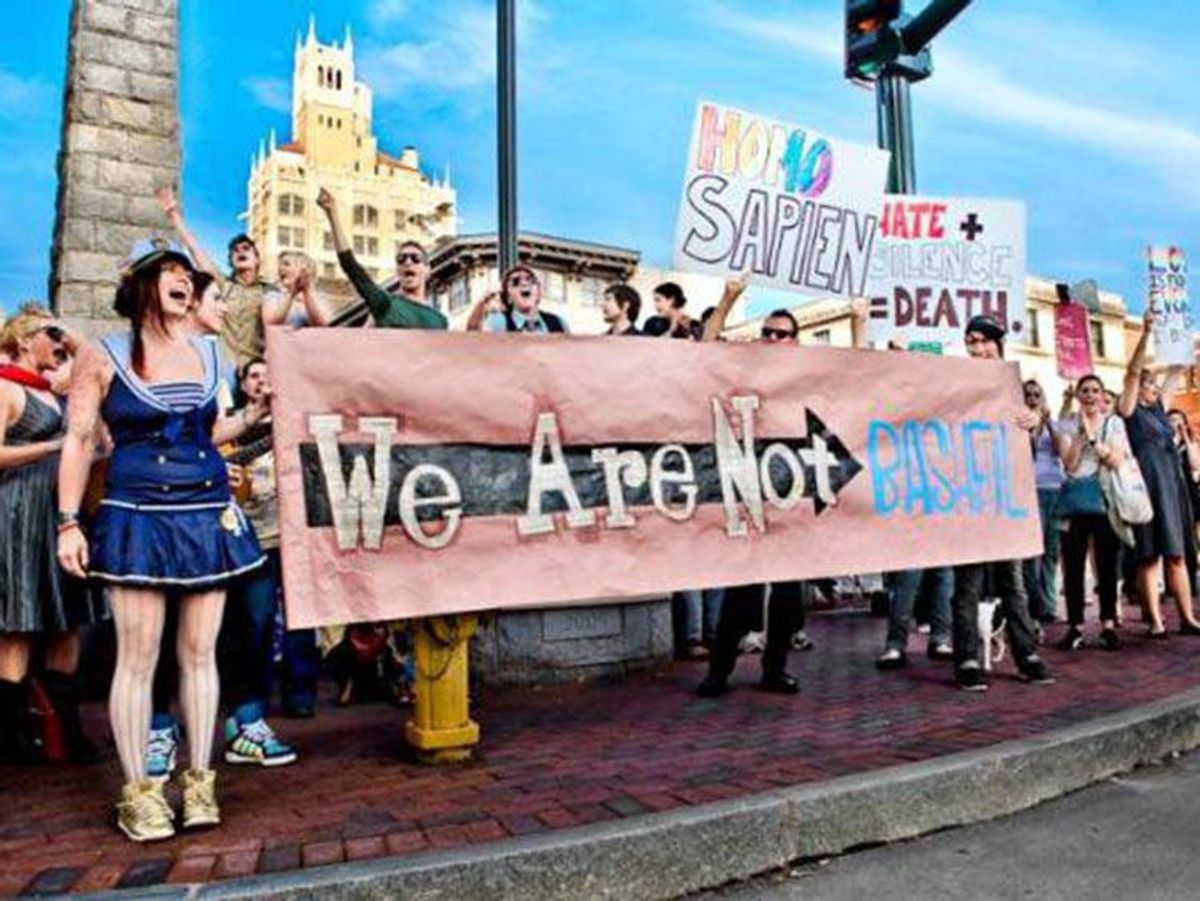It's Transgender Day of Visibility. Here I am. I am a trans man. I am white. I "pass" as cisgender (nontrans). I am also a once-homeless youth from South Carolina, who spent the majority of my transition, writing career, and LGBT advocacy work in Asheville, N.C. After spending eight years in North Carolina, I left last April for an internship in Manhattan, and now I live in New Orleans.
Basically, I am southern and transgender. And thanks to North Carolina's transphobic House Bill 2, for the first time ever, this particular identity is being recognized as needing support and resources. This might seem like a cause for celebration, since it could feel like there's finally space for people like me to share our stories amid all the other narratives about LGBT life in America. But my mood is anything but festive.
Instead, my perpetual state of being as a trans person today tends to be one of the five stages of grief. Obviously, I can't speak for all trans people, but I believe grief plays a tremendous role in so many of our lives. I know that I grieved the loss of my old identity, and that I am far from the only one to mourn the loss of family and friends after coming out. I grieve any time a trans person dies by suicide or is murdered. I grieve when someone deadnames me or chooses to misgender me. Many of us grieve the loss of financial stability when we decide to pursue life as our authentic selves.
So in the spirit of today's International Transgender Day of Visibility, I need to make visible my grief around North Carolina's hateful new law.
My initial reaction to the bill's lightning-speed passage was denial. I told my girlfriend about all of the bills being presented in recent weeks, and about HB 2 on the phone while she was driving home from work. I was numb as I described how HB 2 was introduced and passed by both chambers of the state's general assembly in under 12 hours. I shrugged it off. "This is scary but won't last," I said. I considered denying who I am. Maybe I would be happier if I wasn't visible, I thought. Maybe I should be stealth and live safely in my passing privilege.
Then came the bargaining -- which for me manifests as anger and blame. I keep going back to instances where my identity was made to feel second-class to the fight for the rights of gay, cisgender people in North Carolina.
I think back to a group I founded in Asheville, called Just Us For All. We had a wide range of goals and accomplishments, all focused around an ethos that centered trans radical queer liberation. We created a list of safe, gender-neutral bathrooms citywide with safe2pee; we helped get trans folks to the Philadelphia Trans Health Conference; we collaborated with other organizations on LGBT issues; we created safe and inclusive social events; we mentored youth, and we educated the public.
But the last time JUFA had a booth at Asheville's Pride event, we were scuttled away in the "Adult Village." Across the street from the main pride event, Adult Village was a place for people and passions deemed too taboo for children. It felt like a secret, salacious location -- like being queer and trans was somehow inappropriate for the family-friendly main event. I felt dismissed and hidden.
I had a similar reaction in 2013 when a prominent marriage equality organization in Asheville effectively asked JUFA to cancel an annual event because this larger, better-funded group had a demonstration planned for the same day. The cis lesbian leaders of that organization called me just days before JUFA's annual rally (pictured above) called "We're Not Bashful."
Initially created in response to gay and trans bashing in Asheville, WNB has lived on as an annual call to action to end anti-LGBT bullying. But in that year, WNB was slated to occur on the same day the larger organization was planning a demonstration outside the Asheville courthouse, which was refusing to issue marriage licenses to same-sex couples. The implication of the request that we cancel our event was explicit: "Your message will be blurred with ours. Observers will think WNB is connected to our organization. We can't have that." Even though we had been planning our annual event all year -- and publicizing it for a month -- I agreed to reschedule in hopes that this group would come to our event and support us if we accommodated their request. They didn't.
Right now, I'm depressed and anxious. I worry about what happens next. It's hard to look at our present reality and not feel the sting of a decades-long movement to prioritize marriage equality (which predominately, though not exclusively, benefits cisgender LGB people) that seems to have ignored trans folks. Now that marriage equality is the law of the land, conservative legislators have turned their hatred toward trans people. I want to believe the same cisgender gay, lesbian, and bisexual activists who made marriage a reality will have our backs now that the right wing has placed a target there, but my experiences don't leave me feeling optimistic.
I am heartbroken at the state of transphobia in the world. I am so sad at how often my community turns on one another. I fear that all the work I've done in my past was for nothing. I feel hurt that some cis LGB people are threatened by trans folks asking for more support and visibility. I wish more trans men were visible in the media.
To top it off, I have been experiencing severe dysphoria in the past week, and it's making me feel isolated and alone. I worry that, in my grief, I have spent less time present with the goodness in my life. I feel as though my transition sometimes has taken more from me then it has given to me emotionally.
Reaching that final stage of grief -- acceptance --is so hard for me. How do you accept the pain, injustice, death, and hatred thrown at you while simultaneously trying to fight it? It's downright contradictory to accept something that you are demanding be changed.
Of course, the pain of loss frequently motivates activism. Mothers who have lost children have lobbied to reduce gun violence, and black folks who have lost members of their community to police violence have pushed back on that violence with the movement for black lives. Such devotion to creating change can be a vital and empowering part of healing.
Where does acceptance fit in to this puzzle, though? I can fight blindly and not feel my pain. I can fuel my fight with anger -- which may be effective externally, but won't help me take care of myself internally. Can we really accept that hate and fear-mongering won out in North Carolina, in Houston, and in who-knows-how-many-places that have similar legislation pending?
I need to accept that my past happened. We, as trans people, have been dismissed by cisgender people, over and over. And so we are hurting. I accept that I am in pain, but refuse to believe that I am weak for acknowledging that anguish.
So today, I am making my grief visible. I am not shielding myself in armor made of anger and blame. Grief doesn't go away, but it can ebb as we start the healing process. Today, I wish for my entire beautiful, resilient trans family throughout the country -- and around the world -- to be open to the grief we are feeling. Our mourning may well help illuminate the path home, to a place that is safe and peaceful and our own amidst the exhausting work of putting our lives on the line to enact change.
I'm still here. I'm still southern. I'm still trans. I'm still healing.
 BASIL SOPER is a transgender writer, activist, and Southerner who wears his heart on his sleeve. He wants to write a memoir and continue utilizing intersectional practices while operating in the social justice field. He can be reached at www.ncqueer.com.
BASIL SOPER is a transgender writer, activist, and Southerner who wears his heart on his sleeve. He wants to write a memoir and continue utilizing intersectional practices while operating in the social justice field. He can be reached at www.ncqueer.com.


 BASIL SOPER is a transgender writer, activist, and Southerner who wears his heart on his sleeve. He wants to write a memoir and continue utilizing intersectional practices while operating in the social justice field. He can be reached at
BASIL SOPER is a transgender writer, activist, and Southerner who wears his heart on his sleeve. He wants to write a memoir and continue utilizing intersectional practices while operating in the social justice field. He can be reached at 










































































